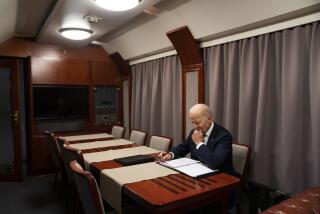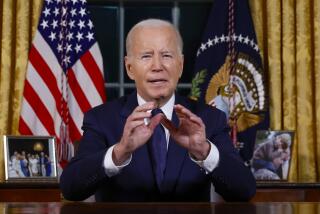U.S. Policy Is Skewed by Americans’ Anxieties
- Share via
In the last few years it has become a cliche that the United States is interdependent with other nations. But that idea has now taken on a personal meaning in U.S. foreign policy. First with terrorism and now with drugs, as the lives of individual Americans have become affected, the line between foreign and domestic concerns has largely been erased.
Both houses of Congress have voted overwhelmingly to direct the U.S. military services to help interdict the flow of drugs into the United States. This breaks with a longstanding tradition of prohibiting the armed forces from exercising police powers. Popular anxiety about drugs is so intense, however, that opposing arguments were overwhelmed.
One such argument is feasibility. It is inconceivable that the U.S. armed forces can shut off or even seriously curtail the flow of illicit drugs into the United States. The sources are too diverse, the trade is too lucrative, and there are too many avenues into the country. Ironically, many of the same members of Congress who scorn President Reagan’s Strategic Defense Initiative have endorsed this new SDI, a “stop drugs initiative.” But both are nonsense for the same reason: Both drugs and nuclear explosives come in such small packages that critical amounts are sure to get through. Nevertheless, Congress wants the armed forces to be engaged, if only to make us feel that something useful is being done.
Many people also argue that the United States should impose punitive sanctions against countries that do not halt drug exports. These suggestions have become important in major part because of the difficulties of facing the key aspect of the problem: the demand for drugs here at home. Blaming the threat on foreigners and taking action, however ineffectual, is easier than confronting the high costs and social complexities of education and treatment--much less the emotionally charged debate about the value of decriminalizing drug use.
The parallel with terrorism is instructive. Only a handful of Americans abroad have been put at risk. Yet on a number of occasions Middle East-born terrorism has dominated the American media, kept the U.S. government from focusing on anything else and led millions of Americans to change their travel plans. We demanded that the government do something, and it bombed Libya. That was reassuring to Americans, but it had as little effect on the root problem of terrorism as indicting Panama’s leader had on the flow of drugs into this country.
The drama inherent in these two issues, terrorism and the drug trade, has led to a domestication of these foreign-policy issues in the sense of reducing their complexities to a matter of individual harm. The media have been quick to seize this, magnifying far out of proportion the threat (terrorism) or the capacity of the United States to act against foreign miscreants (drugs). The American people thus become vulnerable to manipulation, either by those like Middle Eastern terrorists who wish to do us harm or by those in the United States who welcome a distraction from irksome domestic issues.
A major part of the problem lies in a lack of candor by many U.S. public officials both in the executive branch and in Congress. It was only after the Iran-Contra debacle that the Reagan Administration admitted that the U.S. government could not protect all Americans abroad, that there is no simple answer to terrorism. In fact, that admission made the United States less susceptible to terrorists’ manipulation. It has also proved convenient for many U.S. leaders to blame American economic problems on Japan and others to a degree far beyond the censure earned by their unfair trading practices. And it is easy to incite passions against countries like Iran, well beyond what the facts warrant, as a release for a host of frustrations.
As a nation being dragged into direct intercourse with the outside world, we will make necessary adjustments only if our political leaders choose to educate the American people rather than exploit public unease. That is rarely rewarding. Jimmy Carter tried it several times, and was never thanked for it. In trying to justify his arms sales to Iran, Ronald Reagan cited that country’s strategic importance. While correct, that point did not gain public favor, and he never repeated it, to the disservice of U.S. interests in the Persian Gulf.
A new President will take office in January, confronting a world that is less respectful of America’s wishes and more demanding of America’s understanding. We the people can ask to be told what we want to hear, even when, as with drugs and terrorism, the garbled message is still frightening. Or we can ask for the truth, with all of its often unpleasant choices of response. But that is the only way the United States can cope with a world that will never again leave us alone.
More to Read
Sign up for Essential California
The most important California stories and recommendations in your inbox every morning.
You may occasionally receive promotional content from the Los Angeles Times.










